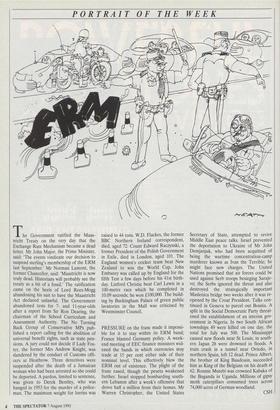PORTRAIT OF THE WEEK
The Government ratified the Maas- tricht Treaty on the very day that the Exchange Rate Mechanism became a dead letter. Mr John Major, the Prime Minister, said: The events vindicate our decision to suspend sterling's membership of the ERM last September.' Mr Norman Lamont, the former Chancellor, said: 'Maastricht is now truly dead. Historians will probably see the treaty as a bit of a fossil.' The ratification came on the heels of Lord Rees-Mogg abandoning his suit to have the Maastricht Act declared unlawful. The Government abandoned tests for 7- and 11-year-olds after a report from Sir Ron Dearing, the chairman of the School Curriculum and Assessment Authority. The No Turning Back Group of Conservative MPs pub- lished a report calling for the abolition of universal benefit rights, such as state pen- sions. A jury could not decide if Lady Fos- ter, the former Mrs Andrew Knight, was slandered by the conduct of Customs offi- cers at Heathrow. Three detectives were suspended after the death of a Jamaican woman who had been arrested so she could be deported. A pardon, limited to sentence, was given to Derek Bentley, who was hanged in 1953 for the murder of a police- man. The maximum weight for lorries was
raised to 44 tons. W.D. Flackes, the former BBC Northern Ireland correspondent, died, aged 72. Count Edward Raczynski, a former President of the Polish Government in Exile, died in London, aged 101. The England women's cricket team beat New Zealand to win the World Cup. John Emburey was called up by England for the fifth Test a few days before his 41st birth- day. Linford Christie beat Carl Lewis in a 100-metre race which he completed in 10.09 seconds; he won £100,000. The build- ing by Buckingham Palace of green public lavatories in the Mall was criticised by Westminster Council.
PRESSURE on the franc made it impossi- ble for it to stay within its ERM band; France blamed Germany policy. A week- end meeting of EEC finance ministers wid- ened the bands in which currencies may trade at 15 per cent either side of their nominal level. This effectively blew the ERM out of existence. The plight of the franc eased, though the peseta weakened further. Israel stopped bombarding south- ern Lebanon after a week's offensive that drove half a million from their homes. Mr Warren Christopher, the United States Secretary of State, attempted to revive Middle East peace talks. Israel prevented the deportation to Ukraine of Mr John Demjanjuk, who had been acquitted of being the wartime concentration-camp murderer known as Ivan the Terrible; he might face new charges. The United Nations promised that air forces could be used against Serb troops besieging Saraje- vo; the Serbs ignored the threat and also destroyed the strategically important Maslenica bridge two weeks after it was re- opened by the Croat President. Talks con- tinued in Geneva to parcel out Bosnia. A split in the Social Democratic Party threat- ened the establishment of an interim gov- ernment in Nigeria. In two South African townships 49 were killed on one day; the total for July was 500. The Mississippi caused new floods near St Louis; in south- ern Japan 28 were drowned in floods. A train crash in a tunnel near Oviedo, in northern Spain, left 12 dead. Prince Albert, the brother of King Baudouin, succeeded him as King of the Belgians on his death at 62. Ronnie Mutebi was crowned Kabaka of the Buganda in Uganda. Millions of gipsy moth caterpillars consumed trees across 74,000 acres of German woodland.
CSH


















































 Previous page
Previous page